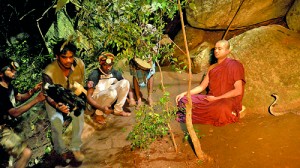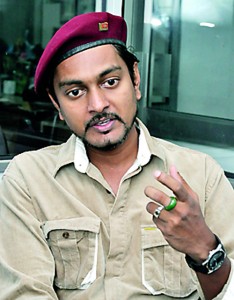Bhavatarana: Moving away from story-telling
Young film-maker Daevinda Kongahage envisions a different future for films in Sri Lanka. With his maiden feature film, Bhavatarana as the launching pad, his aim is to navigate the next generation of film-makers to explore different genres and expose audiences to wider perspectives.

Still from the movie: History, Buddhism and contemporary society entwined
Daevinda believes that when compared to the global film world, Sri Lanka is still lagging behind as it is absorbed in just one film language where the focus is on story-telling.
“Even the viewers have been trained to a story-telling cinematic mode. We watch, we clap and come out. Except for a few film-makers in Sri Lanka, we are prone towards this story- telling cinematic culture. Therefore, the next generation of film-makers is automatically being pushed towards this,” he says adding that Bhavatarana is a complete deviation from this format as the film gives something for the viewer to think about. “I want the public to be awakened; to give them something to think about; to let them experience a new cinematic language,” he adds.
The film was initially shot as a television serial titled Bhavasarana, now in the post production stage, but he hastens to add that it is not the same story or mode of presentation that one sees in the film. Daevinda feels the director should have the ability to manipulate the

The making of the movie
plot in different ways. Nevertheless, the role he played directing two different versions for film and television simultaneously, taking the plot along two different paths had its challenges, he says.
Bhavatarana, depicts the nexus between Buddhist culture and politics, how politicians try to manipulate Buddhist culture and vice versa.
“Sometime back I sensed the impending conflict between politics and Buddhist culture. Then I got a script for a TV series written by Ajith Mendis and I saw in it some cinematic features that got me interested in developing it for film. I began researching this particular historical period of the Nayakkar king of Sri Lanka- King Keerthi Sri Rajasinghe and came across the book written by Prof. L.S. Devaraja titled ‘The Kandyan Kingdom’ that describes well the entire Kandyan Kingdom and the political situation that prevailed then. That had a chapter dedicated to Keerthi Sri Rajasinghe.
“During my research I also realized there is an area in relation to that period that has been concealed with only fragmented details being known. There were other writings and scripts that were not brought to the public. Even the Mahawamsa did not reveal these facts.” He hopes to get his audience thinking as to where Buddhist culture should stand in relation to politics.

Young film-maker Daevinda Kongahage
Born in Colombo, Daevinda grew up both in Kandy and Colombo, immersed both in politics as well as the arts due to the influence of his father, Sarath Kongahage and mother Suvineetha Weerasinghe. He started his film career as a child artiste aged 11 when Dharmasiri Bandaranayake chose him for the films Bhavaduka and Bhavakarma.
His early exposure to TV came when he was Asst. Art Director on a TV-series done by his mother. Later on, he worked at Sirasa TV as an Assistant Producer and later rose to Executive Producer, before leaving to start out on his own.
Among his credits is an international documentary on Sir. Arthur C. Clarke shot for his 85th birthday. Daevinda’s TV-series Sadisi Tharanaya bagged seven awards at the Sumathi and Raigam Tele Awards in 2008.
His vision is for a vibrant film-culture that would breed good film-makers. “The question of who is a director should be defined by him – not the public or hall owners. A film-maker should have a vision within him and then come into film making. There should be different social figures from a politician to a beggar living in him. He should see the society from different perspectives. He should be able to look into the past and the future independently, unbiased. This is what makes a film maker. Technicalities come after,” he says passionately.


